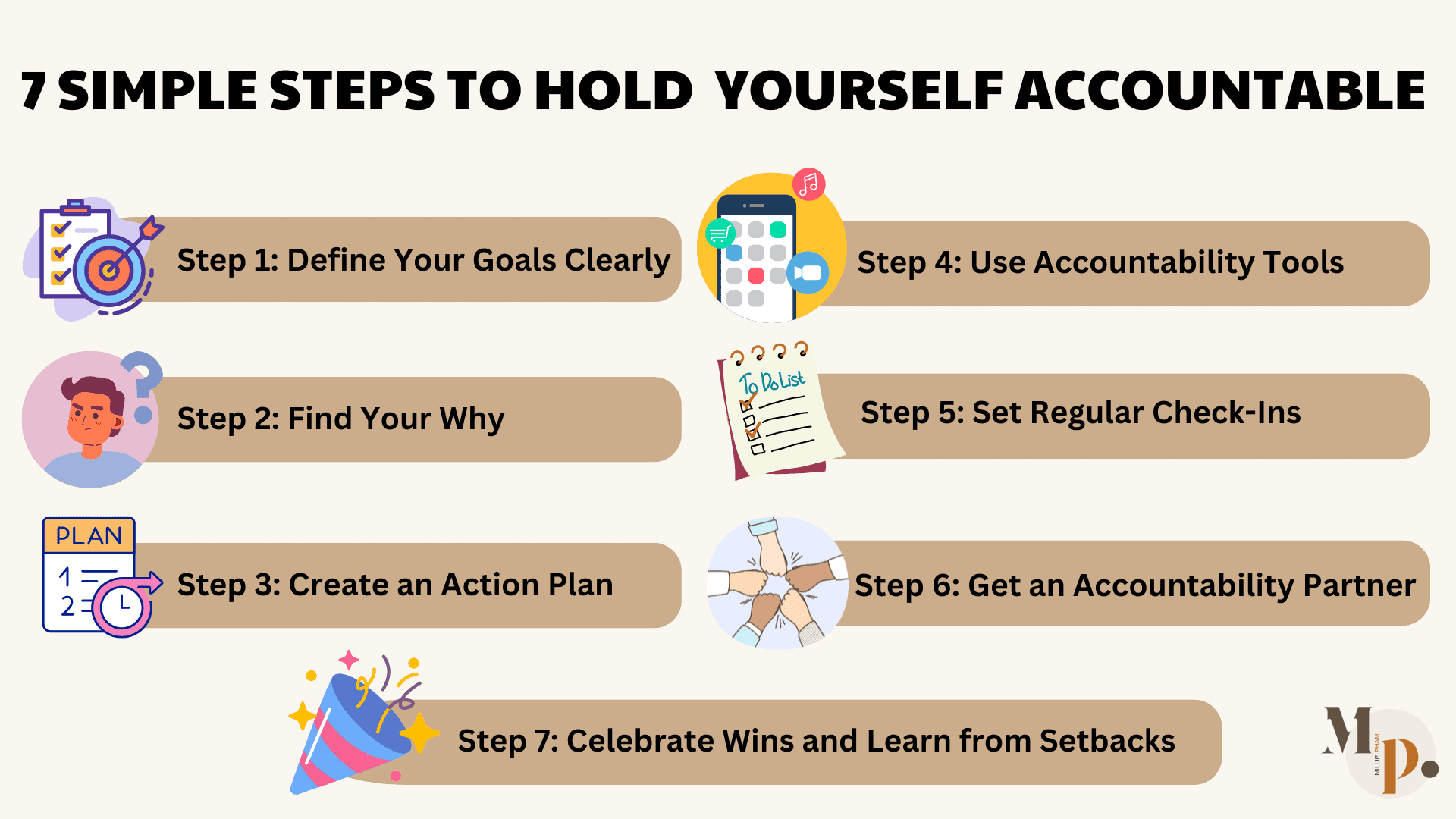We all struggle with staying on track when it comes to our goals—whether they’re short-term goals like daily habits or long-term goals like career growth.
It’s easy to get sidetracked, leaving us feeling stuck and frustrated.
But here's the thing: learning how to hold yourself accountable to your goals is a game-changer for personal development.
In fact, people who set clear accountability systems are 65% more likely to accomplish their goals.
In this article, I’ll show you 7 simple steps to help you start small and build the momentum needed to achieve your goals. Let’s dive in!
7 Simple Steps to Hold Yourself Accountable:

Step 1: Define Your Goals Clearly
The first step in holding yourself accountable is setting clear goals. Begin by identifying exactly what you want to achieve, and make sure it’s specific.
For example, rather than saying, “I want to be healthier,” aim for something like, “I will walk 10,000 steps every day for the next three months.” This makes it easier to track your progress and see how you’re doing.
The SMART framework is a great tool to guide this process. SMART stands for Specific, Measurable, Achievable, Relevant, and Time-bound.
Using this framework, you can break down your larger goals into smaller, more manageable milestones.
For example, if your goal is to save $5,000 in a year, you could aim to save $417 each month.
This helps you stay focused and keeps you motivated as you hit those smaller targets.
Step 2: Find Your Why
Once you’ve set your goals, connecting them to a deeper reason that matters to you is important.
Ask yourself: why are these goals important in your life?
Maybe you want to improve your health to have more energy for your kids, or perhaps you’re saving money to feel more secure in your future.
Understanding the “why” behind your goals makes them feel more personal and meaningful.
When you link your goals to a strong emotional reason, you’re more likely to stay motivated, even when things get tough.
For example, if your goal is to run a marathon, focusing on how much you have completed will boost your confidence and keep you pushing through difficult training sessions.
Research shows that people with a clear purpose are more likely to stick with their commitments, which is key to staying accountable when motivation dips.
Step 3: Create an Action Plan
After setting your goals, it’s time to break them down into small, manageable tasks. Think about what you can do every day or every week to make progress.
For example, if your goal is to read 12 books this year, you can aim to read a few pages each day. Creating an action plan like this helps you stay organized and focused.
By having a clear, step-by-step plan, you’ll know exactly what to do next. This also makes it easier to track your progress and celebrate small wins along the way.
Small victories, like finishing a chapter or hitting a weekly target, help build momentum.
Plus, when you know what your next steps are, it’s easier to stay accountable and on track.
Studies show that people who track their progress are more likely to achieve their goals
Step 4: Use Accountability Tools
Accountability tools can make a big difference in keeping you on track. You can use habit trackers, apps, or accountability planners to regularly check in on your progress.
Popular tools like Notion, Motion (My review here), or HabitBull are great options that let you organize tasks, set reminders, and monitor how far you’ve come.
Setting reminders and tracking your progress can help reinforce accountability. Each time you check something off your list, you get a little boost of motivation.
Plus, reviewing your progress daily or weekly helps you stay focused on your goals and quickly spot areas where you might be slipping.
Tools like these make it easier to stay on track and committed. Studies have shown that tracking your goals increases the chances of achieving them.
Step 5: Set Regular Check-Ins
To stay on track with your goals, it’s important to schedule regular check-ins.
These could be daily, weekly, or monthly—whatever works best for you.
During these check-ins, take a moment to look at your progress and see how things are going.
If you’re hitting your targets, great! If not, it’s a good time to adjust your goals or action plan as needed.
Regular check-ins keep you aware of both your progress and any challenges you’re facing.
They help you catch problems early and keep you from feeling overwhelmed.
Reflecting on what’s working and what isn’t also improves your self-accountability.
For example, a weekly review of your to-do list can highlight areas where you’re falling behind, giving you a chance to refocus.
Consistently evaluating your progress makes a big difference in staying committed to your goals
Step 6: Get an Accountability Partner
Having an accountability partner can make a big difference when it comes to sticking to your goals.
Whether it's a friend, a colleague, or a professional coach, having someone to check in with keeps you motivated and focused.
Studies show that having an accountability partner can increase your chances of success by up to 95%—that's a huge boost for your commitment!
When choosing a partner, look for someone reliable and committed, someone who shares similar values or goals.
This way, you’ll motivate each other and keep pushing forward, even when things get tough.
You can also engage in accountability groups, like mastermind groups or accountability partner platforms such as GoalsWon, which pairs you with a coach to provide daily feedback and support.
Tools like this can help you stay on track with regular check-ins and personalized advice.
Reporting to someone regularly adds a level of responsibility that’s hard to ignore.
Whether you're using apps, scheduling weekly video calls, or just sending progress updates, having that support makes you more likely to follow through on your goals.
Step 7: Celebrate Wins and Learn from Setbacks
Celebrating even the smallest wins is important to keep yourself motivated and positive throughout your journey.
When you reach a milestone, no matter how small, take a moment to recognize your progress.
This helps build momentum and reminds you that every step counts toward your bigger goals.
At the same time, setbacks are a normal part of the process. When you face one, don’t let it stop you.
Instead, reflect on what happened and learn from it. Ask yourself, “What can I do differently next time?”
Adjust your plan as needed and keep moving forward. If you miss a goal, try to break it down into smaller, more manageable tasks to make it less overwhelming.
The key is to not dwell on the mistake but to use it as a learning experience.
Finally, remember to be kind to yourself. Practicing self-compassion is essential for long-term accountability.
Being too hard on yourself can lead to burnout, but if you treat setbacks as lessons, you’ll stay motivated to continue working toward your goals in a healthy, sustainable way.
Conclusion
By following these 7 simple steps, you’ll be well on your way to holding yourself accountable.
The process doesn’t have to be overwhelming—start small, stay consistent, and use the right tools to guide your journey.
Remember, it’s not about perfection but progress.
So, why wait? Choose one step today and take action. Your future self will thank you!
Read more: 21 Real-life Examples of Accountability in The Workplace
